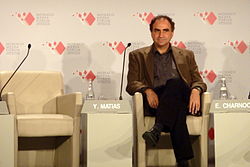
Yossi Matias is an Israeli-American computer scientist, entrepreneur and Google executive.
Matias is Vice President, Engineering & Research at Google, and the founding managing director of Google's Center in Israel.[1] He is on the leadership team of Google's Research, the global exec lead overseeing Google’s Health AI,[2][3] Crisis Response and Climate AI efforts,[4] and leads efforts in Conversational AI. For over a decade he was on the leadership team of Google’s Search, building and leading efforts including Google Trends, Google Autocomplete, Search Console, and Search experiences in weather, sports, dictionaries and more.
Matias established the Research and Development Center of Google in Israel.[5] growing it to over 2000 on staff,[6] with efforts working on Search, AI, Waze, Cloud and Chip design. He led the development of Google products such as Google Trends, Google Insights for Search, Google Suggest, Google Visualization API, Ephemeral IDs for IoT.[7] He is leading efforts in Conversational AI including Google Duplex,[8][9] Call Screen,[10] Live Caption,[11] Live Relay,[12] Recorder,[13] and Euphonia.[14]
He pioneered an initiative to bring cultural and heritage collections online, such as the Yad Vashem Holocaust Memorial Museum archive,[15] the Dead Sea Scrolls.,[16] and the Nelson Mandela Archive,[17] which along with Google Art Project seeded up Google Cultural Institute.[18] He is leading a global initiative for Crisis Response[19] and Flood Forecasting.[20]
Matias is the executive lead and founder of Google's Campus Tel Aviv,[21] a technology hub for promoting innovation and entrepreneurship and birthplace of programs such as Campus for Moms and LaunchPad, which has evolved into Launchpad Accelerator, and LaunchPad Studio for AI & ML focused startups.[22] He is a founding lead of Google's AI for Social Good initiative.
Prof. Matias is on the computer science faculty at Tel Aviv University, and previously a research scientist at Bell Labs and a visiting professor at Stanford. He published extensively in the areas of data analysis, algorithms for massive data sets, data streams and synopses, parallel algorithms and systems, data compression, data and information management systems, security and privacy, video processing, and Internet technologies. He is the inventor of over 60 patents. He pioneered some of the early technologies for the effective analysis of big data, internet privacy and contextual search.
Matias is a recipient of Gödel Prize,[23] an ACM Fellow[24] and a recipient of Paris Kanellakis Theory and Practice Award[25] for seminal work on the foundations of streaming algorithms and their application to large scale data analytics.